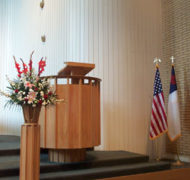Should Churches Display the American Flag in Their Sanctuaries?
Blog / Produced by The High Calling
I sit in the pew and look up at the choir members as they sing one of my favorite hymns. In front of them is the pulpit, front and center, indicating that the proclamation of the Word of God is the center of what is going on here.
Beside the pulpit, I see two flag poles. On the first there is a white flag with a blue field in the upper left corner displaying a red cross—the “Christian Flag.” On the other flag pole I see the familiar stars and stripes of the American flag.
It makes me wonder, especially in light of this day on which we celebrate American independence, if that flag has a place in this sanctuary.
Last year Christianity Today had three deep thinkers, Douglas Wilson, Lisa Velthouse, and Russell D. Moore, give their distinct views on the subject, “Should Churches Display the American Flag in Their Sanctuaries?”
Douglas Wilson, pastor of Christ Church in Moscow, Idaho, and author of many books, including Letter from a Christian Citizen, wrote, “Just don’t do it.” He bases his view on the principle that Christianity reverses the consequences of Babel.
“Our churches should not place any unnecessary barriers to the worship of visiting Koreans, Russians, or Portuguese. We already must deal with natural and providential barriers, such as differences in language. In Christ there is neither Jew nor Gentile (Gal. 3:28). I wouldn't want to worship in a sanctuary with a Scythian flag up front (Col. 3:11), and the Golden Rule requires that we not do to the visiting Scythians what we didn't very much like when they did it to us.
The New Testament is all about this principle. Where customs interfere with transnational fellowship, those customs must give way (Acts 15:29).Placing a flag in a sanctuary has many possible implications. It could convey the idea that we claim some sort of ‘favored nation’ status. It could imply we believe that the claims of Caesar extend into every space, including sacred spaces. It could imply that our version of Christianity is similar to some kind of syncretistic ‘God and country’ religion, where patriotism and religion are one and the same.”
Lisa Velthouse, author of the memoir Craving Grace: A Story of Faith, Failure, and My Search for Sweetness, writes, “It's all right by me.” As a Marine Corps wife, she says that she has a newfound respect when she sees American symbols.
"Less than a week before I sat down to write this, a man my husband had served with was killed in combat, and several others from their company were seriously wounded. The rest of us do not have to bear the costs those men paid because they volunteered to pay them on our behalf. Every day they went to work knowing the risks.
"In the military, such sacrifice is so common that at times it almost ceases to seem extraordinary. But it has echoes and glimmers of what is most incredible in Christian faith: that one would willingly lay down his life for his friends. Greater love has none than this, and even the extreme pacifist doesn't scorn it. This is one of the reasons why our flag is not out of place in a church."
Russell D. Moore, President of the Southern Baptist Ethics & Religious Liberty Commission and a contributor to the book First Freedom: The Baptist Perspective on Religious Liberty, says, “Fly it responsibly.” Moore says that he empathizes with pastors who are uncomfortable with the American flag in the sanctuary.
"I agree with the impulse behind such a pastor's concern. The church, after all, isn't an outpost of American society but instead a colony of the kingdom of Christ (Eph. 1:22-23; Phil. 3:20). Christian worship isn't a routine act of mere civil society, like a parent-teacher association meeting or a union gathering, but instead a gate between the covenant body and the larger gathering of the redeemed of all ages in heaven (Heb. 12:22-24).
"The flag can be a perilous thing in an American evangelical subculture so infected with civil religion. Sometimes patriotism for the United States seems easier than patriotism for the New Jerusalem because it's so experientially immediate."
But Moore believes that this should not negate the displaying of the American flag.
"This doesn't mean that we should treat Old Glory like an Asherah pole. Patriotism is dangerous, yes, but that's because it's a strong natural affection that's rooted in something good and right. When rightly applied, patriotism is akin to what God commands us to do in showing honor to our father and mother.
"When we honor our country, we are recognizing that we are not self-made or self-situated. We are here, placed by God in a particular plot of land, because of the sacrifices of forefathers and foremothers we haven't known. We have a responsibility to our neighbors of all faiths for the generations to come."
What do you think and why?
To read the whole of each argument, be sure to read the entire article here.
Image by Kaihsu Tai [Public domain], via Wikimedia Commons.





